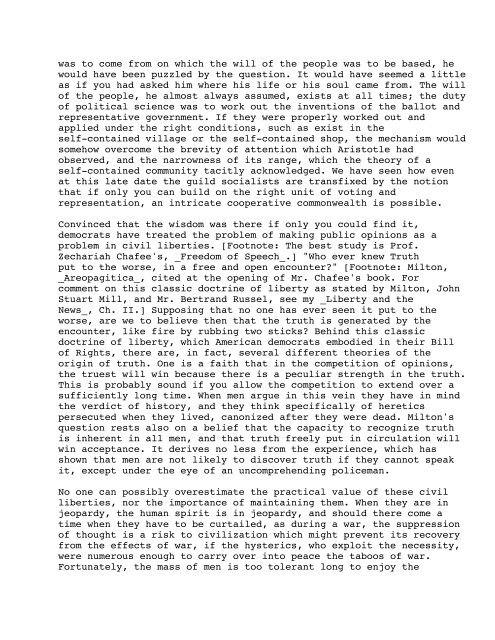PUBLIC OPINION by WALTER LIPPMANN TO FAYE LIPPMANN ...
PUBLIC OPINION by WALTER LIPPMANN TO FAYE LIPPMANN ...
PUBLIC OPINION by WALTER LIPPMANN TO FAYE LIPPMANN ...
You also want an ePaper? Increase the reach of your titles
YUMPU automatically turns print PDFs into web optimized ePapers that Google loves.
was to come from on which the will of the people was to be based, he<br />
would have been puzzled <strong>by</strong> the question. It would have seemed a little<br />
as if you had asked him where his life or his soul came from. The will<br />
of the people, he almost always assumed, exists at all times; the duty<br />
of political science was to work out the inventions of the ballot and<br />
representative government. If they were properly worked out and<br />
applied under the right conditions, such as exist in the<br />
self-contained village or the self-contained shop, the mechanism would<br />
somehow overcome the brevity of attention which Aristotle had<br />
observed, and the narrowness of its range, which the theory of a<br />
self-contained community tacitly acknowledged. We have seen how even<br />
at this late date the guild socialists are transfixed <strong>by</strong> the notion<br />
that if only you can build on the right unit of voting and<br />
representation, an intricate cooperative commonwealth is possible.<br />
Convinced that the wisdom was there if only you could find it,<br />
democrats have treated the problem of making public opinions as a<br />
problem in civil liberties. [Footnote: The best study is Prof.<br />
Zechariah Chafee's, _Freedom of Speech_.] "Who ever knew Truth<br />
put to the worse, in a free and open encounter?" [Footnote: Milton,<br />
_Areopagitica_, cited at the opening of Mr. Chafee's book. For<br />
comment on this classic doctrine of liberty as stated <strong>by</strong> Milton, John<br />
Stuart Mill, and Mr. Bertrand Russel, see my _Liberty and the<br />
News_, Ch. II.] Supposing that no one has ever seen it put to the<br />
worse, are we to believe then that the truth is generated <strong>by</strong> the<br />
encounter, like fire <strong>by</strong> rubbing two sticks? Behind this classic<br />
doctrine of liberty, which American democrats embodied in their Bill<br />
of Rights, there are, in fact, several different theories of the<br />
origin of truth. One is a faith that in the competition of opinions,<br />
the truest will win because there is a peculiar strength in the truth.<br />
This is probably sound if you allow the competition to extend over a<br />
sufficiently long time. When men argue in this vein they have in mind<br />
the verdict of history, and they think specifically of heretics<br />
persecuted when they lived, canonized after they were dead. Milton's<br />
question rests also on a belief that the capacity to recognize truth<br />
is inherent in all men, and that truth freely put in circulation will<br />
win acceptance. It derives no less from the experience, which has<br />
shown that men are not likely to discover truth if they cannot speak<br />
it, except under the eye of an uncomprehending policeman.<br />
No one can possibly overestimate the practical value of these civil<br />
liberties, nor the importance of maintaining them. When they are in<br />
jeopardy, the human spirit is in jeopardy, and should there come a<br />
time when they have to be curtailed, as during a war, the suppression<br />
of thought is a risk to civilization which might prevent its recovery<br />
from the effects of war, if the hysterics, who exploit the necessity,<br />
were numerous enough to carry over into peace the taboos of war.<br />
Fortunately, the mass of men is too tolerant long to enjoy the





